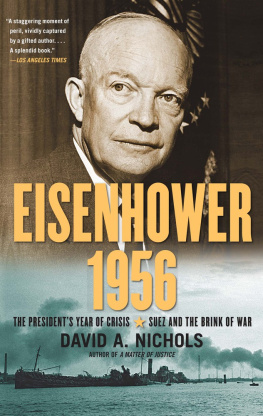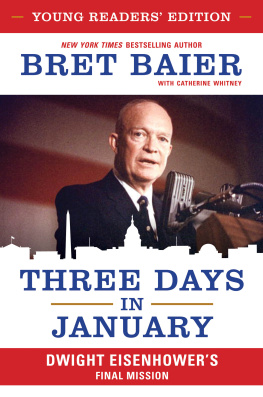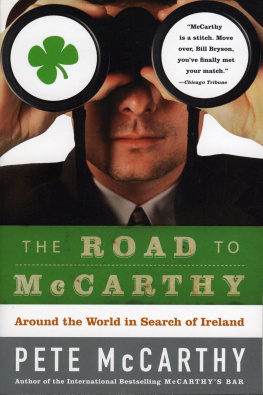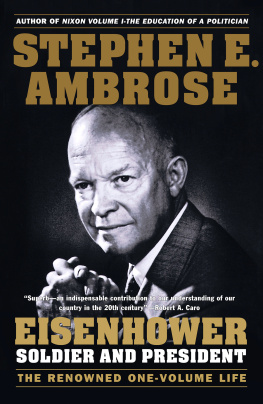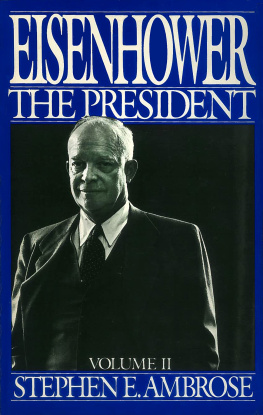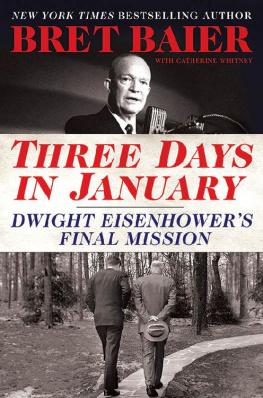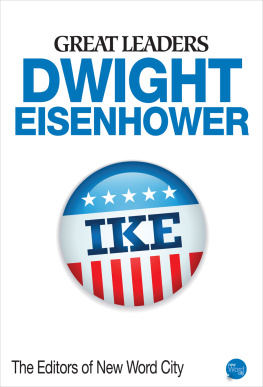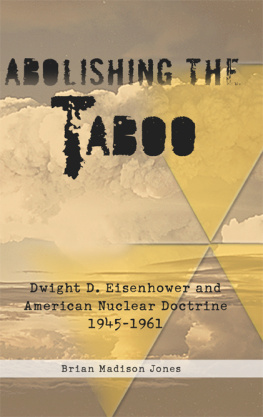Thank you for downloading this Simon & Schuster ebook.
Get a FREE ebook when you join our mailing list. Plus, get updates on new releases, deals, recommended reads, and more from Simon & Schuster. Click below to sign up and see terms and conditions.
CLICK HERE TO SIGN UP
Already a subscriber? Provide your email again so we can register this ebook and send you more of what you like to read. You will continue to receive exclusive offers in your inbox.
We hope you enjoyed reading this Simon & Schuster ebook.
Get a FREE ebook when you join our mailing list. Plus, get updates on new releases, deals, recommended reads, and more from Simon & Schuster. Click below to sign up and see terms and conditions.
CLICK HERE TO SIGN UP
Already a subscriber? Provide your email again so we can register this ebook and send you more of what you like to read. You will continue to receive exclusive offers in your inbox.
ALSO BY DAVID A. NICHOLS
Eisenhower 1956: The Presidents Year of CrisisSuez and the Brink of War
Lincoln and the Indians: Civil War Policy and Politics
A Matter of Justice: Eisenhower and the Beginning of the Civil Rights Revolution

Simon & Schuster
1230 Avenue of the Americas
New York, NY 10020
www.SimonandSchuster.com
Copyright 2017 by David Nichols
All rights reserved, including the right to reproduce this book or portions thereof in any form whatsoever. For information, address Simon & Schuster Subsidiary Rights Department, 1230 Avenue of the Americas, New York, NY 10020.
First Simon & Schuster hardcover edition March 2017
SIMON & SCHUSTER and colophon are registered trademarks of Simon & Schuster, Inc.
For information about special discounts for bulk purchases, please contact Simon & Schuster Special Sales at 1-866-506-1949 or .
The Simon & Schuster Speakers Bureau can bring authors to your live event. For more information or to book an event, contact the Simon & Schuster Speakers Bureau at 1-866-248-3049 or visit our website at www.simonspeakers.com.
Interior design by Lewelin Polanco
Jacket design by Faceout Studio, Charles Brock
Image of Sen. Mccarthy By Usnwr / Al Amy Stock Photo; Image of President
Eisenhower by Everet T Collection Inc / Al Amy Stock Photo
Library of Congress Cataloging-in-Publication Data
Names: Nichols, David A. (David Allen), 1939 author.
Title: Ike and McCarthy : Dwight Eisenhowers secret campaign against Joseph McCarthy / David A. Nichols.
Description: First Simon & Schuster hardcover edition. | New York : Simon & Schuster, 2017. | Includes bibliographical references and index.
Identifiers: LCCN 2016037570| ISBN 9781451686609 | ISBN 1451686609
Subjects: LCSH : Eisenhower, Dwight D. (Dwight David), 18901969. | McCarthy, Joseph, 19081957. | United StatesPolitics and government19531961. | Anti-communist movementsUnited StatesHistory20th century. | Cold WarSocial aspectsUnited States. | Eisenhower, Dwight D. (Dwight David), 18901969Influence. | PresidentsUnited StatesBiography.
Classification: LCC E836 .N5295 2017 | DDC 973.921092dc23 LC record available at https://lccn.loc.gov/2016037570
ISBN 978-1-4516-8660-9
ISBN 978-1-4516-8662-3 (ebook)
To William Bragg Ewald, Jr., and Fred I. Greenstein, pioneers a generation ago in the study of Eisenhower and McCarthy
CONTENTS
PREFACE
Beginning in 1950, Wisconsins junior senator, Joseph R. McCarthy, threw the United States into turmoil with his reckless, unsubstantiated charges that a variety of citizens, especially government employees, were Soviet agents. McCarthys disregard for the truth, his insatiable appetite for headlines, and his willingness to damage reputations turned McCarthyism into an enduring epithet in our political language.
Yet by the end of 1954, McCarthys political influence had been essentially destroyed. How did that happen? The answerfully told for the first time in this bookis that Dwight D. Eisenhower made it happen.
Ironically, in 1953, due to Eisenhowers election, McCarthy acquired a new platform for his crusade. The Republicans held a one-vote majority in the Senate. As a result McCarthy was appointed chair of the Government Operations Committee and its permanent investigative subcommittee. In that capacity, the senator subpoenaed witnesses, conducted one-senator hearings, accused witnesses of guilt by association and labeled as obviously communist anyone who dared to invoke constitutional protections against self-incrimination.
In 1953, the nation was still at war in Korea and recovering from the traumas of depression and World War II. The Cold War with
So Eisenhower did something breathtaking and dangerous; he launched a clandestine operation designed to wrap a scandal around the neck of a prestigious US senator in the presidents own party in an election year. That is what the 1954 Army-McCarthy hearings, lasting almost two months, were really about.
THE CONVENTIONAL WISDOM
The standard explanations for McCarthys political demise are well known: McCarthy, an alcoholic, did himself in; he was damaged by Edward R. Murrows legendary See It Now television program; his reputation was tarnished by the unsympathetic glare of the television cameras and by his confrontation with the wily Boston attorney Joseph Nye Welch at the Army-McCarthy hearings. In this conventional version, the final nail in McCarthys political coffin was the censure vote by the US Senate on December 2, 1954, which McCarthy lost 67 to 22.
In recent years, pro-McCarthy revisionists have attempted to repair the senators reputation by arguing that his political enemies destroyed him to cover up Soviet espionage in the US government. Eisenhower took the possibility of subversion seriously but firmly believed that his methods would be more effective and equitable than McCarthys demagogic tactics.
In 1984, William Ewald published a book called Who Killed Joe McCarthy? Ewald drew on an immense cache of documents that Fred Seaton, the assistant secretary of defense, had collected on President Eisenhowers orders during the 1954 Army-McCarthy
Joseph McCarthys senatorial correspondence has been sealed for the lifetime of his daughter. But my objective is to tell the Eisenhower story that has been so long neglected by historians.
This is a book about a particular era in US historya time when power brokers embraced attitudes and behaviors unacceptable today. Attitudes regarding race, gender, and homosexuality have changed but, in the 1950s, gays and their relationships were not just denigrated, they were openly persecuted. Just the rumornot the factthat a government official was homosexual could cost that person a job. Homosexuals were widely perceived to be security risks, subject to blackmail by communists. As the reader will discover, the Eisenhower administration reflected the prejudice and discriminatory practices of the era.
This is a story about strategic deception, a realm in which Dwight Eisenhower was demonstrably expert. In 1944, the Allies under Supreme Commander Dwight Eisenhower successfully fooled the German leadership about when and where the largest military expeditionary force in human history would land in Europe. Operation Fortitude involved fake armies, dummy landing craft and airfields, fraudulent radio transmissions, and misleading leaks through diplomatic channels and double agents. Eisenhower understood that carefully planned, rigorously implemented deception could confuse an enemy until he makes a mistake; then he can be ambushed. That,
Next page
